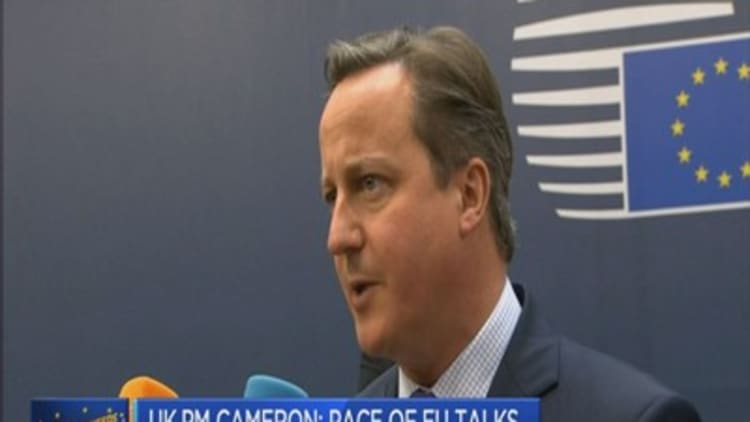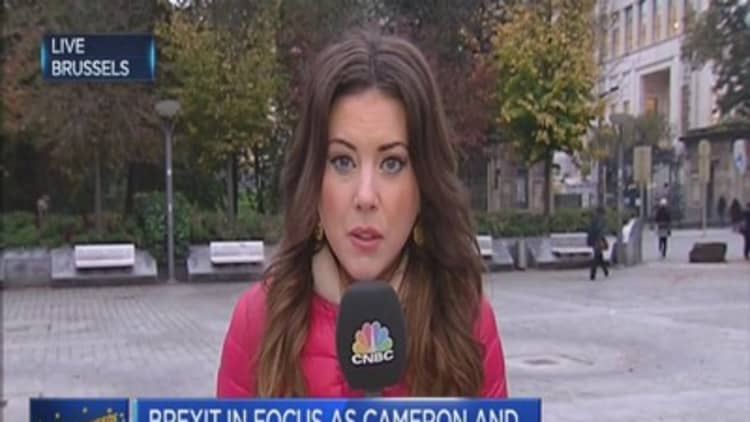When David Cameron writes to fellow European Union leaders in a couple of weeks, asking for new terms of membership, it will be the opening gambit in high-stakes negotiations that could see Britain quit the bloc.
Adding to the complexity and uncertainty of what the prime minister told his party this month would be "bloody hard work" is that he is effectively running two parallel poker games. One is with his 27 peers in the EU, the other with the British people, including Eurosceptic rivals in his own party.
Each card played will influence the risks and chances at the other table. The more he asks of the EU to convince Britons his demands are substantive, the likelier it is he will not get all he wants. The less he asks, the more he risks derision at home.
"The problem is that if David Cameron lays out a big package and comes home with only half, he has a big PR problem," said one senior EU politician who has been briefed privately by the prime minister on what he wants to achieve before calling a promised in-or-out referendum on Britain's membership by late 2017.
"I can't imagine what we can offer to make everyone in London go 'Wow, that is a new built Europe'. So if he sticks to this approach, there's a big risk he will lose this referendum."
The standard negotiating game of bluff, threat and double-bluff will be complicated by the intricacies of managing two sets of bargaining partners, the gulf between EU and UK political culture, and the loud running commentary of the British press.

Concern about plunging into heated public horse-trading helps explain why Cameron has remained silent about his demands for nearly six months since his re-election in May.
That had begun to frustrate EU peers until he told them at a summit last week that he would send them a first full and, crucially, written wish-list early in November.
Who's bluffing whom?
With many Britons convinced their 42-year membership of the bloc is hampering their economy and infringing their liberties, polls show the "Stay" and "Leave" campaigns have all to play for. The Conservative leader says if he gets reforms, which he says will benefit the whole EU, he will call a vote and campaign to stay. Disappoint him, and he may choose the exit himself.
Many in Brussels think that's a bluff. Among EU officials and diplomats representing the other member states, it is a given that Cameron called the referendum mainly as a tactic to outflank Eurosceptic rivals and that he shares the view of other EU leaders that "Brexit" is a recipe for unnecessary economic uncertainty and disruption.
But does he? Convincing all sides that he is open to leaving the EU if he can't get what he wants is crucial to Cameron's strategy.
Read MoreWant a reason why Europe needs swagger: Here's 9
"It would be a mistake at home for Cameron to be seen to have prejudged the outcome of negotiations," acknowledged one EU official close to the negotiators. "The referendum is only winnable if he's not seen to have prejudged the outcome."
Strengthening his hand is a widespread reluctance in Europe to see Britain leave. Losing its second-biggest economy, a nuclear-armed power with global clout, would deal a heavy blow to the EU's prestige as the voice of a continent.
Beyond that, Britain's administrative skills and free-trading bent are valued by many as a counterweight to Berlin and Paris. Given how far the EU was willing to go to keep Greece in the euro zone, British officials believe they have strong cards. If Britons vote to go, divorce negotiations will devour EU management time for years.
Many of Cameron's broad demands, such as lighter regulation, more power to national parliaments, even safeguards for London financiers against the euro zone, have support. "We could do a deal in two hours," a senior EU official asserted.
There is also an emerging consensus in London and Brussels that the kind of binding EU treaty change Cameron promised to British voters can be enshrined in a form that avoids putting it to hard-to-win referendums in other EU states before the UK plebiscite.
But some demands, notably to curb immigration by fellow EU citizens, hit a raw nerve, and officials say it will require huge legal ingenuity to construct a compromise.

In some quarters, there is talk of calling Cameron's bluff. Conservative allies of German Chancellor Angela Merkel in the European Parliament say they will not pay "any price" to keep Britain in.
Running out of time?
To extract concessions before the referendum, which could come as early as next spring or autumn, Cameron will need to press hard for the attention of EU leaders distracted by a succession of crises, from Greece to Ukraine and now refugees.
Polls showing the migrant chaos in Europe giving the Leave camp an edge might strengthen his hand in getting the EU to take notice of him. But it could also reinforce European indifference to his demands.
"There is a risk the Europeans give up, think that Cameron can't deliver a Yes, so why bother to negotiate?" said one source close to the negotiators.
Officials in the EU's executive Commission and the EU Council, which groups the national governments, stress they will battle to the end to keep Britain in.
But they are concerned that painstaking efforts to craft the kind of subtle legal compromises familiar in continental and EU coalition politics could be undone by Britain's winner-takes-all culture. They stress a need to collaborate on a deal but fret that Cameron wants to show voters he has defeated his opponents.
One EU official said: "David Cameron needs a fight. I'm not sure the Europeans understand that. He needs one big thing."
Read MoreWhy European countries give more aid than others
Another said Cameron may need some drama to convince Britons, not least his own party, his negotiations had succeeded: "I would not be surprised if we need to have a crisis."
Other EU leaders, whom Cameron has irritated before with dramatic stands in Brussels that grab headlines back home, may have limited patience. A third official close to EU negotiators said: "He can't win by campaigning only in the UK ... We have to come back to consensus politics."
British officials highlight Cameron's diligent travelling to EU capitals as evidence he has learnt lessons from past showdowns. It also illustrates the complexity of reaching a deal with 27 different partners, some of whom London worries may confuse matters by seeking their own concessions from Brussels.
As all the players put on their poker faces, contradictory assessment and expectation is the rule. EU officials say they expect a "comprehensive" list of demands from Cameron next month and warn he cannot come back to ask for more. But London says his letter will offer only "a bit more detail".
For one senior official in Brussels, talks since the summer to work out a negotiating procedure have been "very smooth", "without arguments". Another source close to those discussions says they were "not straightforward", with division lurking below a surface of polite agreement.
Both sides are nervous about negotiating in the glare of publicity, making Brussels officials sympathetic to reluctance in London to reveal too much of Cameron's hand too soon.
Caution and patience will be the watchwords in Brussels.
"We don't need fights that would hurt David Cameron," one senior EU official said, insisting the aim was to help him win a referendum vote to stay. "This is about the future of Europe."

